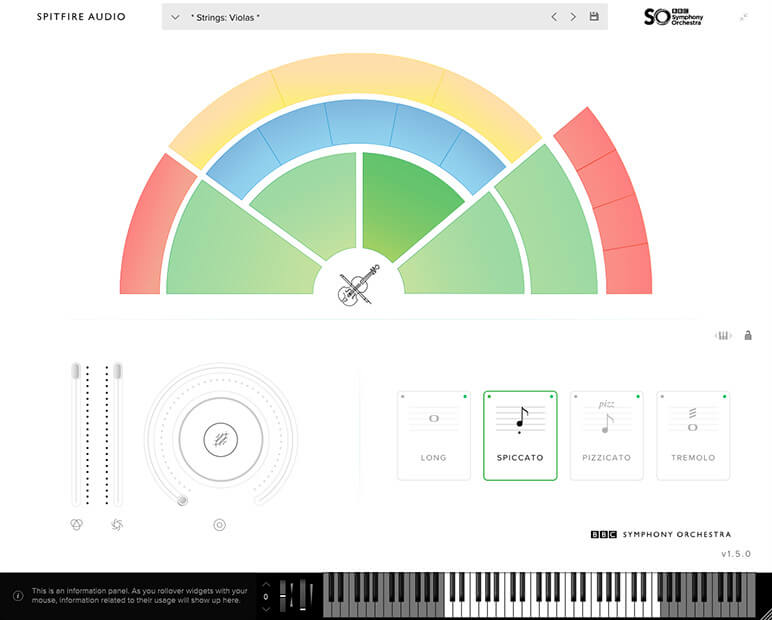Spitfire Audio: BBC Symphony Orchestra Discover

Spitfire Audio’s BBC Symphony Orchestra Discover plugin is a great option to consider if you’re looking for a free solution to expand your instrument library. Despite its compact size of only 200MB, this collection boasts 33 instruments and 47 playing techniques to choose from. Let’s take a closer look at what you can expect to find in BBC Symphony Orchestra Discover, as well as what you won’t find.
A Broad Palette of Instruments
One of the key strengths of Discover is the variety of instruments on offer. In the strings section, you’ll find first violins, second violins, violas, celli, and double basses. Meanwhile, the woodwinds section includes piccolo, flutes, oboes, clarinets, and bassoons. If you’re looking for brass, Discover has got you covered with horns, trumpets, tenor trombones, bass trombones, and tuba. Finally, the percussion section provides harp, celeste, timpani, marimba, xylophone, glockenspiel, tubular bells, and untuned percussion.
A Range of Articulations
To give you more creative control over your compositions, Discover includes a variety of articulations. All instruments feature long notes sustained with a touch of vibrato, as well as short notes played with spiccato or staccatissimo techniques. The strings section also includes pizzicato and tremolo, except for the double bass.
What’s Not Included
Despite the many advantages of Discover, there are a few limitations to keep in mind. Compared to its Pro counterpart, Discover offers fewer instruments and articulations. It also lacks round robin samples and only has a single dynamic layer, meaning you’ll need to use volume (via velocity or mod wheel) to control individual instrument dynamics. Discover also excludes true legato samples and solo players.
A Single Mic Position
Another limitation of Discover is that it only includes a single mic position. However, the position has been carefully chosen to provide an ideal balance between ambient and dry sounds. And if you want more room sound, you can always add reverb in your DAW.
Simplified User Interface
Discover boasts an intuitive user interface that is easy to navigate. The top of the display features an information line, while the upper half of the screen provides two methods to select a patch – either through the dropdown browser or by clicking on the colorful orchestral floorplan. The lower half of the display contains controls to adjust the volume and internal reverb levels. Additionally, buttons enable users to switch between available playing articulations, while keyswitches can be accessed from the C2 region of the MIDI keyboard.
Discover has low RAM requirements, and during testing on a modest Mac Mini, we were able to run a session with all 47 instances of the plugin playing simultaneously without any lag or glitches. The UI’s CPU and disk meters are also useful indicators to monitor performance. We expect that even a basic host computer could run a full orchestral setup without any major issues.
Check out our Logic Pro templates featuring the BBC Symphony Orchestra Discover Piano plugin! These templates showcase the unique sounds and textures that can be achieved with this versatile plugin.
Great Sound Quality in a Compact Package
Despite its modest size, Discover manages to deliver impressive sound quality that surpasses what one would expect from a 200MB library. While it may not match the finesse of more comprehensive orchestral libraries like Core or Pro, Discover’s underlying samples are excellent. It features a combination of long and short notes for every string, brass, and woodwind instrument, allowing for slow sustained parts or up-tempo melodic runs.
The looping of sustained notes is expertly executed, resulting in smooth transitions. The short articulations have a crisp attack, and layering long and short notes can add extra depth to sustained notes. Additional string articulations, such as pizzicato, are also included and usable, although it is necessary to use the mod wheel and velocity to achieve maximum dynamics.
One minor drawback is the noticeable low-end bow noise present in some string presets. However, this adds to the realism, and a simple low-cut EQ on the relevant tracks can easily solve any issues in the lower end of the mix.
Conclusion
Discover is an excellent addition to Spitfire Audio’s portfolio for several reasons. It serves as a fantastic entry point into the BBC SO ecosystem for budding orchestral composers while providing potential users with an impressive combination of small footprint and modest computer requirements, without sacrificing sound quality.
While Discover may not be suitable for scoring mainstream TV or film projects, students can utilize its features to compose music for their film school projects. Moreover, working composers can use Discover to sketch ideas on a compact laptop system before transferring the project to Core or Pro for completion. Working with a limited range of sounds during the early stages of composition can be quite liberating, and Discover is perfect for this purpose.
Spitfire Audio has hit a home run with BBC SO Discover. The plugin is free, compact, and delivers remarkable sound quality given its tiny size. While other low-cost or free orchestral sounds are available, Discover sets an incredibly high bar, making it an absolute no-brainer and an ideal tool for anyone looking to explore the world of composing for a full orchestra.
